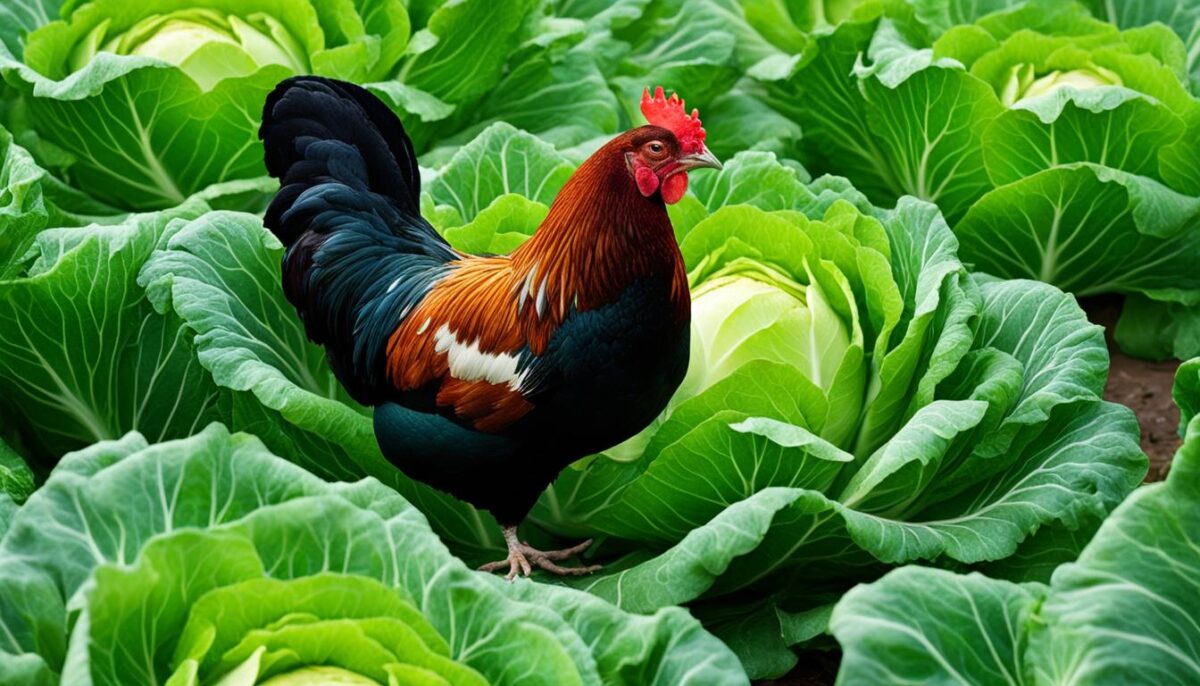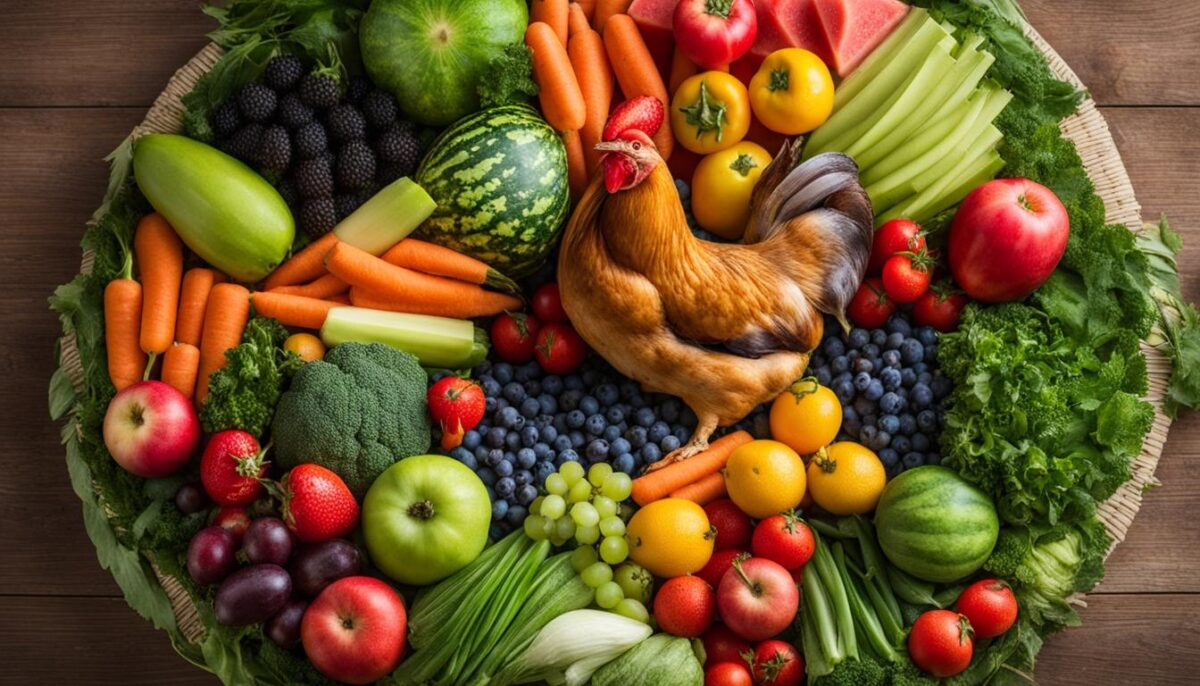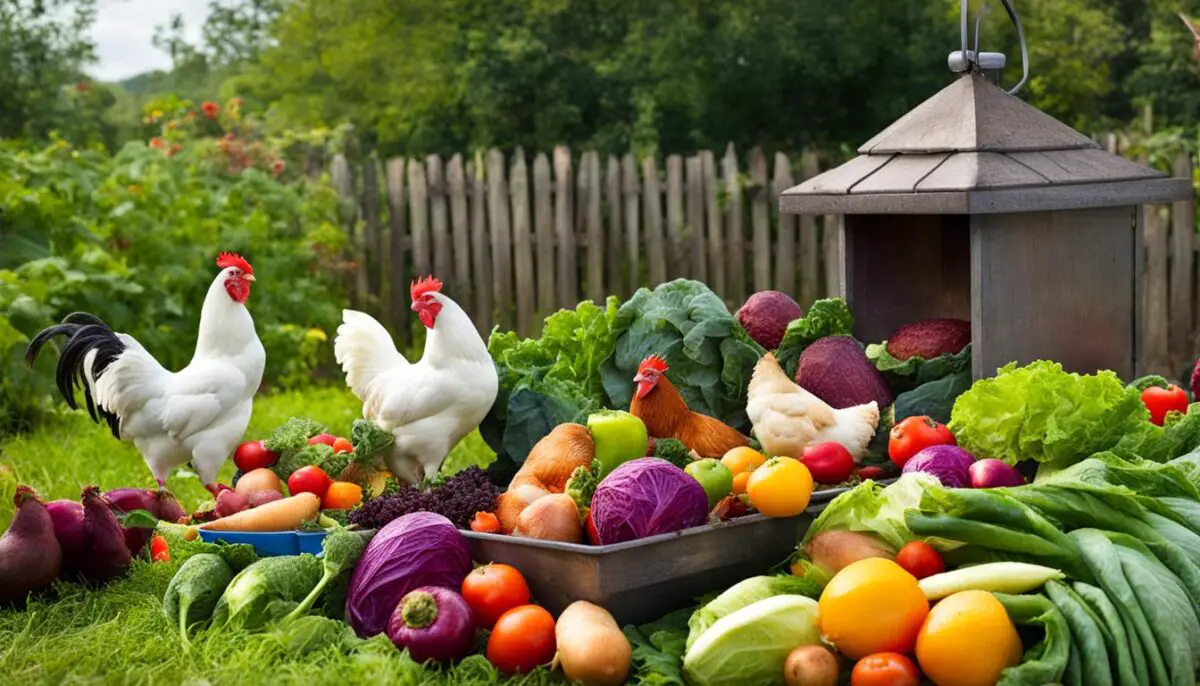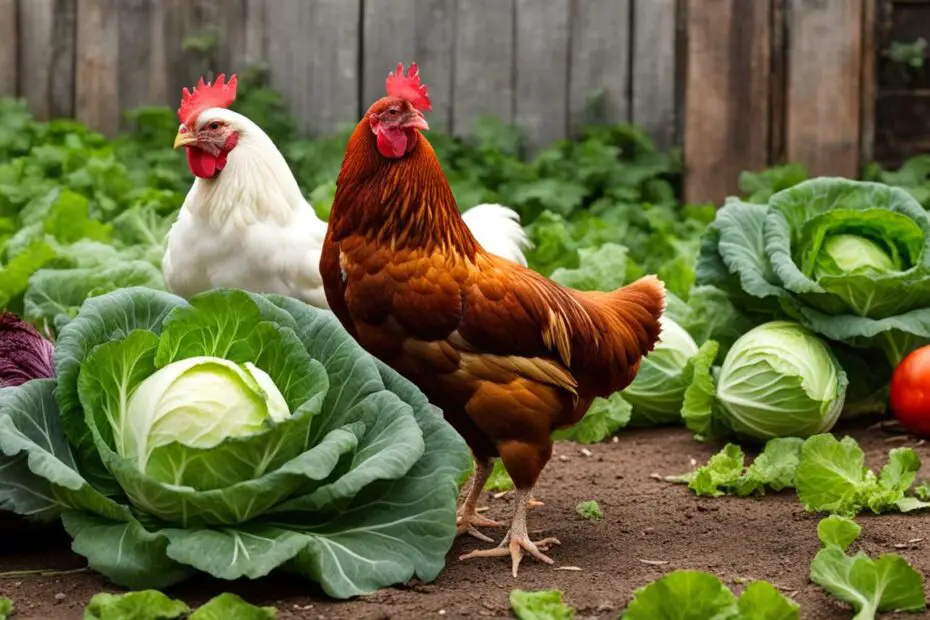Welcome to our poultry feeding guide! If you’re wondering whether chickens can eat cabbage, you’ve come to the right place. In this article, we’ll explore the nutritional benefits of cabbage for chickens, different ways to feed cabbage to your flock, and important considerations to keep in mind. So, let’s dive in and find out if cabbage is a safe and healthy food for your chickens!
Key Takeaways:
- Chickens can safely eat cabbage, including red cabbage, green cabbage, brussels sprouts, and napa cabbage.
- Feed cabbage in moderation as too many treats can negatively affect a chicken’s diet.
- Cabbage contains goitrogens, which can cause avian goiter if offered in excess.
- Cabbage is a nutritious food for chickens, providing vitamins, minerals, fiber, and vitamin K for egg production.
- There are different ways to feed cabbage to chickens, such as serving it in small pieces or hanging it as a boredom-busting activity.
Ways to Make Money by Chicken Farming
Can Chickens Eat Cabbage
Nutritional Benefits of Cabbage for Chickens
Cabbage is a nutritious treat for chickens, providing them with essential vitamins, minerals, and fiber. Its nutritional value makes it a valuable addition to their diet, promoting overall chicken health and well-being.
Vitamins: Cabbage contains vitamin C, which can boost a chicken’s immune system and help them cope with stress, particularly during hot weather. Additionally, cabbage supplies other vitamins that support various bodily functions.
Minerals: Chickens require minerals like potassium and iron for optimal health, and cabbage is a good source of these nutrients. Potassium aids in nerve function and muscle development, while iron supports the production of hemoglobin, which carries oxygen in the blood.
Fiber: Cabbage is rich in dietary fiber, which helps maintain a healthy digestive system in chickens. It aids in proper digestion and prevents issues like constipation.
Overall, while cabbage should be fed in moderation to avoid nutritional imbalances, it can be a beneficial component of a well-rounded chicken diet. As with any treat, cabbage should be provided alongside complete chicken feed to ensure the birds receive all the necessary nutrients for their overall health and egg production.
| Nutrient | Amount per 100g |
|---|---|
| Vitamin C | 36.6mg |
| Potassium | 170mg |
| Iron | 0.5mg |
| Dietary Fiber | 2.5g |
Different Ways to Feed Cabbage to Chickens
When it comes to feeding cabbage to chickens, there are several options that you can consider. Each method offers its own benefits and can add variety to your chickens’ diet. Here are some different ways to feed cabbage to chickens:
1. Fresh and Chopped
Rinse the cabbage thoroughly, removing any moldy or rotten spots. Cut the cabbage into small, easily peckable pieces and serve it to your chickens. This method allows the chickens to enjoy the fresh crunchiness of the cabbage while providing them with essential nutrients.
2. Hanging Treat
Another option is to hang a whole cabbage in the chicken run. This not only provides a boredom-busting activity for the chickens but also encourages natural foraging behavior. As the chickens peck at the hanging cabbage, they can enjoy a tasty and nutritious treat.
3. Cooked and Softened
If your chickens have difficulty pecking at tough cabbage leaves, you can cook the cabbage to soften it. Boil or steam the cabbage until it becomes easier to eat. Once cooked, you can provide larger pieces of cabbage to the chickens, ensuring they receive the nutritional benefits without struggling to consume it.
Remember to always provide grit when feeding cabbage or any other fresh fruits and vegetables to aid in digestion. With these different feeding methods, you can add cabbage to your chickens’ diet in various ways, keeping them happy and healthy.
| Cabbage Type | Vitamin C (mg) | Potassium (mg) | Fiber (g) |
|---|---|---|---|
| Green Cabbage | 36 | 170 | 2.2 |
| Red Cabbage | 57 | 243 | 2.2 |
| Brussels Sprouts | 85 | 342 | 3.8 |
| Napa Cabbage | 19 | 252 | 1.2 |
Considerations When Feeding Cabbage to Chickens
When it comes to feeding cabbage to chickens, there are a few important considerations to keep in mind for their health and well-being. Firstly, it is crucial to rinse and inspect the cabbage before serving it to your flock. This ensures that any moldy or rotten spots are eliminated, reducing the risk of illness or digestive issues for the chickens. can chickens eat cabbage
Chickens may have difficulty pecking at tough cabbage leaves, so it is recommended to cut the cabbage into small pieces or cook it to make it easier for them to eat. This not only ensures that they can consume the cabbage more easily but also enhances the overall palatability of the treat. Additionally, providing grit along with cabbage or any other fresh fruits and vegetables is essential for aiding in digestion. chicken feeding
Using cabbage as a hanging treat can provide both entertainment and nutrition for the chickens. By hanging a whole cabbage in the chicken run, the chickens can peck at it, keeping them engaged and stimulated. This method can also promote natural foraging behavior, allowing the chickens to exhibit their natural instincts.

Can Chicks Eat Cabbage?
Chicks can enjoy cabbage as part of their diet, but there are some considerations to keep in mind. Since their digestive systems are not as developed as adult chickens, it’s important to prepare the cabbage in a way that is safe for them to consume. One option is to cook the cabbage and chop it into small, soft pieces to prevent any choking hazards. This will make it easier for the chicks to eat and digest. chicken health
It’s worth noting that chicks should primarily be fed starter feed until they reach around 6 weeks of age. This specialized feed is specifically designed to meet their nutritional needs during this crucial growth stage. As they mature, treats like cabbage can gradually be introduced into their diet. It’s always a good idea to consult with a poultry nutritionist or veterinarian for guidance on feeding young chicks a balanced and appropriate diet.
Remember, the health and well-being of your chicks are paramount, so it’s important to monitor their reactions to new foods like cabbage. If you notice any signs of digestive upset or discomfort, it may be best to avoid feeding cabbage until they are older and better able to handle the fiber content. In the meantime, stick to their recommended starter feed and consult a professional for further advice. cabbage nutrition for chickens
| Can Chicks Eat Cabbage? | Recommendation |
|---|---|
| Age | Wait until chicks are around 6 weeks old before introducing cabbage into their diet. |
| Preparation | Cook the cabbage and chop it into small, soft pieces to prevent choking hazards. |
| Reaction | Monitor chicks for any signs of digestive upset or discomfort and consult a professional if needed. |
| Feeding Guide | Stick to their recommended starter feed and consult a poultry nutritionist or veterinarian for guidance. |
Other Safe Fruits and Vegetables for Chickens
In addition to cabbage, there are several other fruits and vegetables that are safe for chickens to eat. These treats can provide added nutrition and variety to their diet. Here are some safe options:
| Fruit/Vegetable | Benefits |
|---|---|
| Watermelon | Refreshes and hydrates chickens, especially during hot summer months. |
| Cucumber | Moist and cooling, it can be a great source of hydration for chickens. |
| Lettuce | Provides hydration and some essential nutrients, but should be offered in moderation due to its high water content. |
These fruits and vegetables should also be given in moderation to ensure a balanced diet for chickens. It is important to remember that treats should not replace the majority of their diet, which should consist of complete chicken feed. Offering a variety of safe fruits and vegetables can help prevent boredom and promote natural foraging behavior in chickens.
Always introduce new foods gradually and monitor your chickens’ reactions. If you notice any adverse effects or digestive issues, discontinue the treat and consult a veterinarian if necessary. Remember, the key is moderation and a well-balanced diet for the overall health and well-being of your chickens. safe foods for chickens
Fruits and Vegetables to Avoid Feeding Chickens
While there are many safe fruits and vegetables that chickens can enjoy, there are also foods that should be avoided to ensure their well-being. Some foods can be harmful or even toxic to chickens, so it’s crucial to know what to steer clear of when feeding them. Here are some fruits and vegetables that should not be included in a chicken’s diet:
- Avocado: The skins and pits of avocados contain a toxin called persin, which can be deadly to chickens. It’s important to keep avocados away from your flock to prevent any potential harm.
- Tomato, Pepper, and Eggplant Leaves: These plants belong to the nightshade family and contain a compound called solanine, which is toxic to chickens. It’s best to avoid feeding them these leaves to ensure their safety.
- Sprouting or Green Potatoes: Potatoes that have begun to sprout or have a green tint contain solanine as well. This compound is harmful to chickens and should not be given to them.
By avoiding these fruits and vegetables, you can ensure the health and safety of your chickens. It’s always better to be cautious about what you feed your flock to prevent any potential harm or illness.

Benefits of a Varied Diet for Chickens
Feeding a varied diet to chickens can have numerous benefits for their overall health and well-being. A diverse range of foods can provide essential nutrients that support optimal chicken health, including vitamins, minerals, and fiber. By incorporating different treats like cabbage into their diet, chickens can enjoy a more varied and interesting eating experience. chicken feeding guide
One of the key advantages of a varied diet is that it can prevent boredom in chickens. When chickens have access to a variety of foods, they are less likely to become bored or exhibit unhealthy behaviors such as feather picking or aggression. Offering treats like cabbage not only provides mental stimulation but also encourages chickens to engage in natural foraging behaviors, which is beneficial for their physical and mental well-being. what can chickens eat
In addition, a varied diet can support egg production in hens. Certain foods, including cabbage, contain essential nutrients like vitamin K that are important for the production of high-quality eggs. By diversifying the diet and providing a good balance of nutrients, chickens are more likely to lay strong, healthy eggs.
| Benefits of a Varied Diet for Chickens |
|---|
| Prevents boredom |
| Encourages natural foraging behavior |
| Supports egg production |
| Provides a good balance of nutrients |
However, it is important to note that treats should not make up the majority of a chicken’s diet. Complete chicken feed should still be the main source of nutrition, as it is formulated to meet all of a chicken’s dietary requirements. Treats like cabbage should be given in moderation to avoid nutritional imbalances or any potential negative effects on health.
In conclusion, a varied diet that includes treats like cabbage can offer several benefits for chickens. It can prevent boredom, encourage natural foraging behavior, support egg production, and provide a balance of nutrients. By incorporating a diverse range of foods into their diet, chicken owners can help keep their feathered friends happy, healthy, and thriving. chicken care

Conclusion
In conclusion, cabbage can be a safe and nutritious addition to a chicken’s diet when fed in moderation. It provides vitamins, minerals, and fiber that support chicken health and egg production. However, it is important to be mindful of certain considerations when feeding cabbage to chickens. chicken nutrition
Cabbage should be rinsed and inspected for any moldy spots before serving it to your flock. It is recommended to cut the cabbage into small, easily peckable pieces or cook it to make it more digestible for chickens. Providing grit is also necessary to aid in the digestion of cabbage and other fresh foods.
While cabbage is a healthy treat for chickens, it should not make up the majority of their diet. Maintaining a balanced and varied diet is essential for their overall health and well-being. There are also other safe fruits and vegetables that chickens can enjoy, such as watermelon, cucumber, and lettuce, but all treats should be given in moderation.
Remember, keeping chickens healthy involves providing them with a balanced diet, taking their specific dietary needs into account, and ensuring they have access to fresh water and a suitable environment. By following these guidelines, you can ensure that your chickens thrive and enjoy the benefits of a varied and nutritious diet.
FAQ
Can chickens safely eat cabbage?
Yes, chickens can safely eat cabbage, including red cabbage, green cabbage, brussels sprouts, and napa cabbage.
Can too much cabbage negatively affect a chicken’s diet?
Yes, it is important to feed cabbage in moderation as too many treats can negatively affect a chicken’s diet.
What are the potential risks of feeding cabbage to chickens?
Cabbage contains goitrogens, which can cause avian goiter if offered in excess. Chickens on feed containing soybeans should also be monitored for their consumption of cruciferous vegetables like cabbage.
What nutritional benefits does cabbage provide for chickens?
Cabbage is a healthy food for chickens, providing vitamins, minerals, fiber, and vitamin K for egg production.
How should cabbage be prepared for chickens?
Cabbage should be rinsed and inspected for any moldy spots before serving it to chickens. It can be cut into small pieces, hung in the chicken run, or cooked to make it easier for them to eat.
Do chicks eat cabbage?
Yes, chicks can eat cabbage, but it is recommended to cook or chop it into small, soft pieces to avoid choking hazards.
What other fruits and vegetables can chickens safely eat?
Watermelon, cucumber, and lettuce are other safe fruits and vegetables that chickens can eat.
Are there any fruits or vegetables that should be avoided when feeding chickens?
Avocado skins and pits, tomato, pepper, and eggplant leaves, as well as sprouting or green potatoes, should be avoided when feeding chickens.
What are the benefits of a varied diet for chickens?
A varied diet can provide a range of nutrients to support overall health and egg production, as well as prevent boredom and encourage natural foraging behavior.


